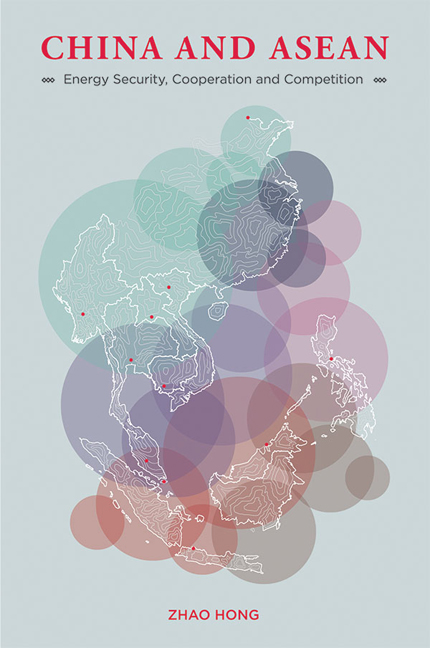Book contents
- Frontmatter
- Contents
- List of Tables and Figures
- List of Abbreviations
- Acknowledgements
- 1 Introduction: China, ASEAN, and the New Global Energy Order
- 2 Economic Growth and Energy Security
- 3 China's Energy Quest in Southeast Asia
- 4 Case Study (1): Myanmar
- 5 Case Study (2): Indonesia
- 6 Energy Resource Competition and the South China Sea Disputes
- 7 Conclusion
- Index
- About the Author
2 - Economic Growth and Energy Security
Published online by Cambridge University Press: 19 May 2017
- Frontmatter
- Contents
- List of Tables and Figures
- List of Abbreviations
- Acknowledgements
- 1 Introduction: China, ASEAN, and the New Global Energy Order
- 2 Economic Growth and Energy Security
- 3 China's Energy Quest in Southeast Asia
- 4 Case Study (1): Myanmar
- 5 Case Study (2): Indonesia
- 6 Energy Resource Competition and the South China Sea Disputes
- 7 Conclusion
- Index
- About the Author
Summary
China and most ASEAN countries are characterized by high economic growth and rapid increase in energy resource consumption. Although these countries are trying hard to find appropriate energy alternatives, increase energy efficiency, and diversify energy resources, they are becoming increasingly dependent on imported oil and gas, and the unstable Middle East and Africa are set to remain their predominant sources of oil and gas. Thus high dependence on fossil fuels poses several security concerns and challenges, including a widening gap between supply and demand, transportation of oil and gas resources on vulnerable sea routes, and energy-related CO2 emissions. This chapter mainly analyses these three dimensions in the context of regional and global perspectives.
ECONOMIC GROWTH AND ENERGY DEMAND
Energy Demand Drivers
The demand for energy resources in Asia is predominately driven by two factors. The first is “industrial-led” demand related to economic growth, a structural shift from non-mechanized forms of manufacturing and production to more energy-intensive ones, especially for commodities such as iron and steel, cement and glass, paper and pulp, basic chemicals, and non-ferrous metals. The second is “consumption-led” demand as population grows and living standard rises (urbanization), bringing more energy-intensive lifestyles that revolve around automobiles, air conditioning, and disposable goods.
Economic Growth
Over the past decades, China and ASEAN have undergone a profound economic and social transformation. This has largely been attributed to their openness to international trade and foreign investment. Although this region has been affected by the recent global financial crisis, it is assumed that if energy supplies are abundant enough, this region, especially some of its emerging economies, will continue to enjoy economic growth and progress over the long term. China and Vietnam are expected to continue to grow faster than other economies in the region, followed by Indonesia, the Philippines, and Malaysia. China now, as the world's second largest economy, will gradually shift from an investment/exportoriented economy to an import/consumption-oriented economy over the medium to long term and see a gradual productive population fall amid the ageing of its population.
- Type
- Chapter
- Information
- China and ASEANEnergy Security, Cooperation and Competition, pp. 24 - 76Publisher: ISEAS–Yusof Ishak InstitutePrint publication year: 2015



